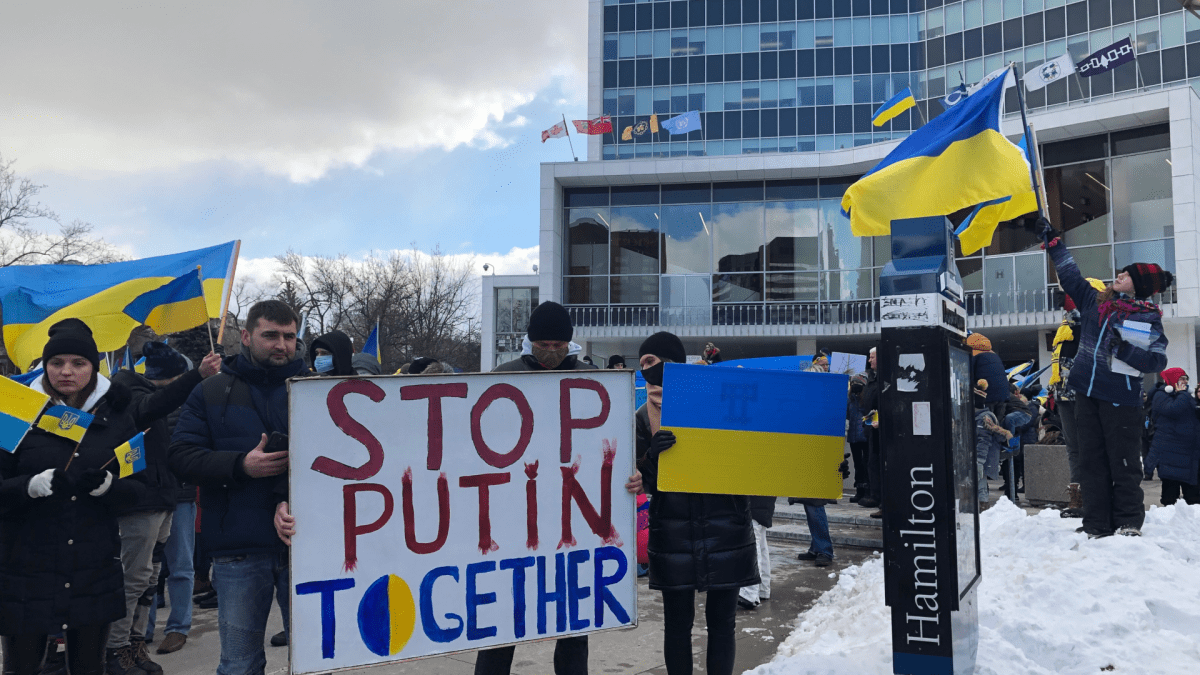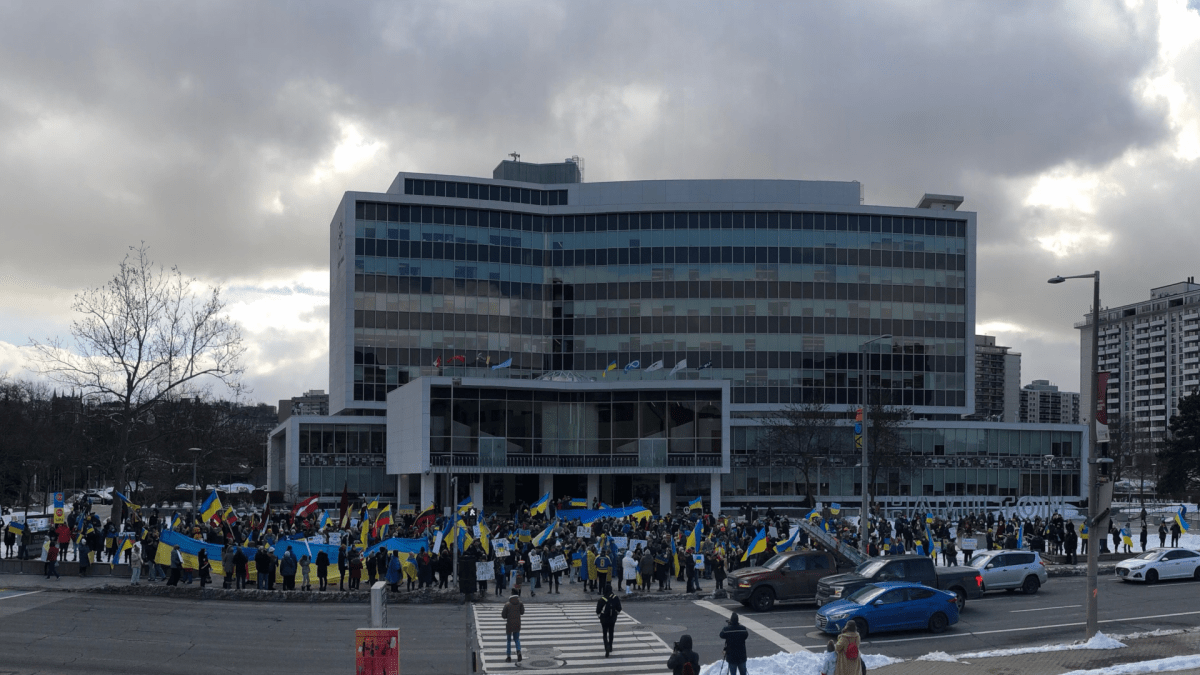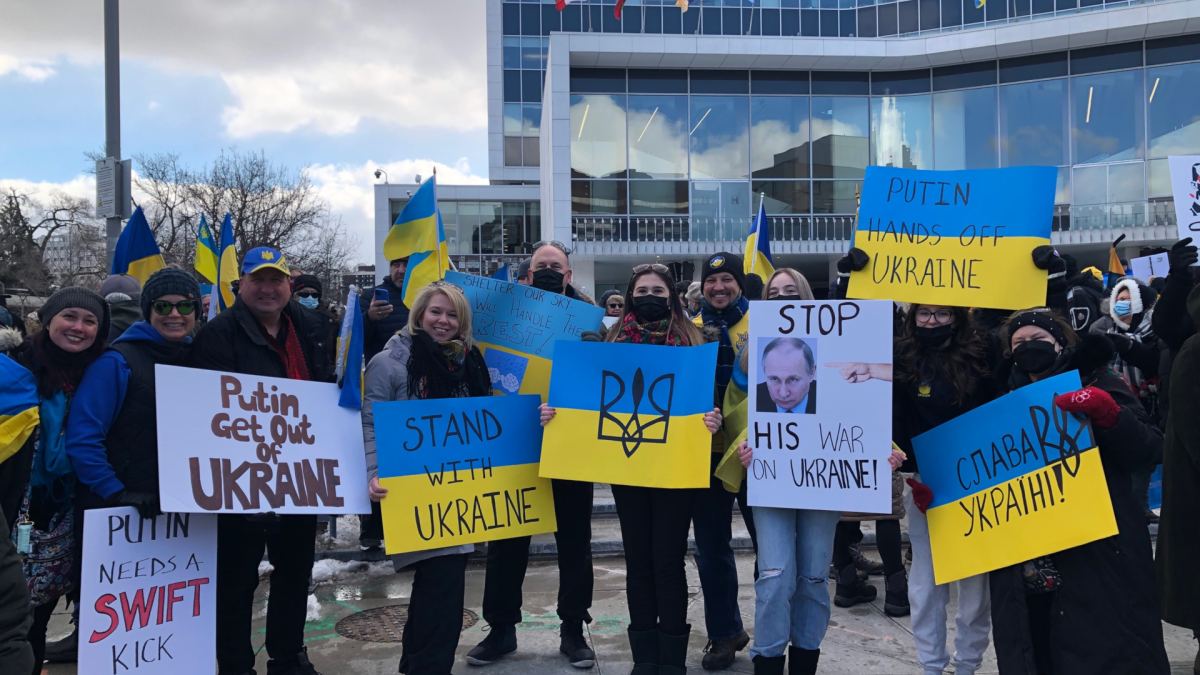The president of Hamilton’s chapter of the Ukrainian National Federation says he’s been impressed by the “unprecedented” support seen in the global community in recent days, particularly rallies across the democratic world on the weekend.

Konstantyn Sheweli told Global News families that sharing stories of what loved ones in Ukraine are going through is the kind of support he believes could keep potential disinformation campaigns about what’s happening in the Eastern European country at bay.
“It’s crucial that the world knows what’s going on,” Sheweli told 900 CHML’s Good Morning Hamilton.
“People need to talk. We need to make each other aware of what is going on and share information, share those firsthand accounts.”
His comments come a day after hundreds flooded Hamilton’s city hall forecourt with blue and yellow, joining compatriots across Canada who did the same in their localities.
Large crowds gathered in downtown Toronto on Sunday for a “Mega March” at Nathan Phillips Square, while more crowds were seen at Place du Canada in downtown Montreal and thousands out front of the legislature in Victoria, B.C.
During Mayor Fred Eisenberger’s appearance at the Hamilton rally, he said city officials will be reaching out to the local Ukrainian community and setting up an ad hoc committee to resettle refugees.
The city has been flying the flag of Ukraine at city hall since Thursday as a sign of solidarity with the country’s people and the 27,000 Ukrainian-Canadians who call Hamilton home.
The rallies come as talks began to secure a ceasefire in Ukraine with officials from both sides meeting in Belarus, while the United States took more stringent action by closing its embassy in Belarus, and allowing non-essential staff at the embassy in Russia to leave the country.
Washington also blocked Americans from engaging in any transactions involving Russia’s central bank, National Wealth Fund and the finance ministry in further punishment of Moscow.
Meanwhile, Canada is considering sending additional weapons to Ukraine and slapping Russia with more sanctions, in an effort to put “maximum pressure” on the Kremlin, according to foreign affairs minister Melanie Joly.
“Our goal … has been really to make sure that we are suffocating the Russian regime,” Joly said, adding that “everything is on the table”.
Sheweli says he’s been lucky enough to keep in touch with some of his family still situated in Ukraine since communications with the western part of the country have not been disrupted.
However, he hasn’t been able to contact family in the eastern side of the country since the bombing began.
“We spoke with them the day before and the following day they were evacuated and we haven’t heard from them since,” Sheweli said.
“So we do not know where they are currently within the borders of Ukraine or whether they’re alive.”
- Life in the forest: How Stanley Park’s longest resident survived a changing landscape
- Bird flu risk to humans an ‘enormous concern,’ WHO says. Here’s what to know
- Mental health support still lacking 4 years after mass shooting: Nova Scotia mayor
- Buzz kill? Gen Z less interested in coffee than older Canadians, survey shows
According to Ukraine’s health ministry, at least 352 civilians, including 14 children, have been killed and 1,684 people have been wounded so far.
Russia launched its full-scale invasion of Ukraine last Thursday, with President Vladimir Putin claiming that “neo-Nazis” rule Ukraine and threaten his country.
Ukraine and Western governments have said the assertion is baseless propaganda, and world leaders have condemned the aggression while sanctioning Russia and cutting off several of its banks from a critical international payments network.
Gregor Kranjc, associate professor with the Department of History at Brock University, believes Putin will likely be spending the next few weeks employing “propaganda gymnastics” in order to convince Russians that the assault on Ukraine is justified.
In a lengthy televised speech last Monday, the leader claimed modern Ukraine was entirely created by Bolshevik Communist Russia and criticized former politician and political theorist Vladimir Lenin for supporting a confederation of the states that were able to become independent after the Soviet Union collapsed in 1991.
Putin went on to say that bringing Ukraine back into the fold would protect Russian sovereignty.
“That’s part of his rhetorical plan to basically say that Ukraine was never really a country, never had a history of statehood,” Kranjc said.
– With files from the Canadian Press











Comments